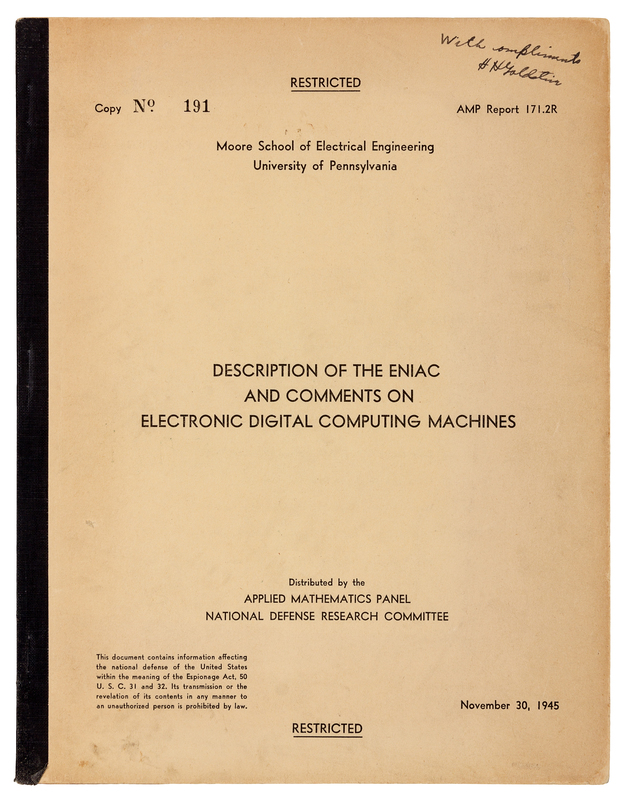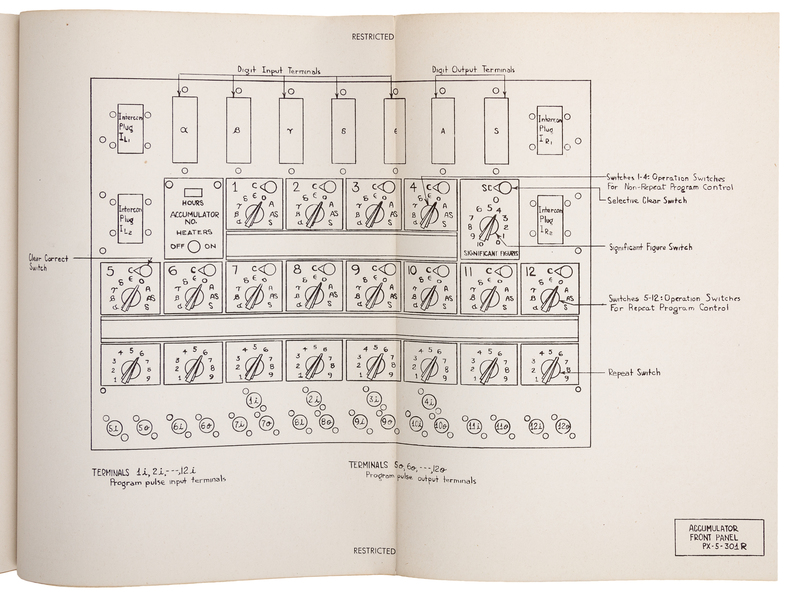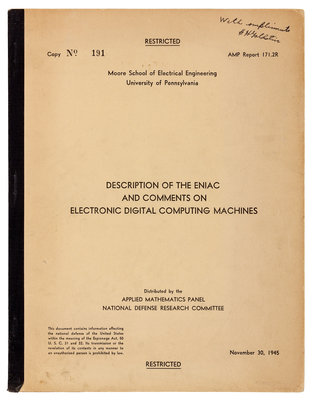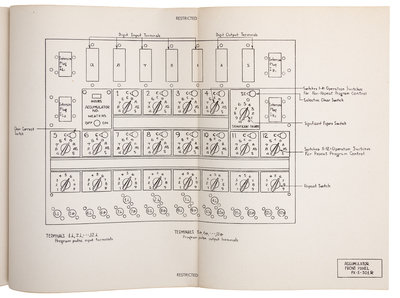Condition Report
Contact Information
Auction Specialist
Lot 35
[ENIAC]. ECKERT, J. Presper (1919-1995), Herman H. GOLDSTINE (b.1913), and John G. BRAINERD. Description of the ENIAC and comments on electronic digital computing machines. N.p.: Applied Mathematics Panel, National Defense Research Committee, November 30, 1945. FIRST EDITION, PRESENTATION COPY.
Sale 714 - Library of a Midwestern Collector
Nov 5, 2019
10:00AM CT
Live / Chicago
Own a similar item?
Estimate
$5,000 -
7,000
Price Realized
$8,750
Sold prices are inclusive of Buyer’s Premium
Lot Description
[ENIAC]. ECKERT, J. Presper (1919-1995), Herman H. GOLDSTINE (b.1913), and John G. BRAINERD. Description of the ENIAC and comments on electronic digital computing machines. N.p.: Applied Mathematics Panel, National Defense Research Committee, November 30, 1945.
4to (280 x 215mm). 3 folding plates, text diagrams. Original printed wrappers, stapled with original cloth backing; quarter morocco folding case.
FIRST EDITION OF THE RARE RESTRICTED INTERNAL FIRST REPORT ON THE OPERATIONAL ENIAC. INSCRIBED BY A PROJECT FOUNDER HERMAN H. GOLDSTINE on the front wrapper: “With compliments / H. H. Goldstine.”
In the spring of 1945 the National Defense Research Committee (NDRC) was becoming very interested in electronic computers, and Warren Weaver, head of the NDRC's Applied Mathematics Panel, asked John von Neumann to write a report on the Moore School's ENIAC and EDVAC projects. Von Neumann was unable to fulfil Weaver's request, so Weaver assigned the task to John Grist Brainerd, director of the ENIAC project. Brainerd was eager to have the report appear under his name, but Eckert and Mauchly objected, since Brainerd was largely unfamiliar with the scientific aspects of the project. After some internal dispute, it was agreed that the report's authors should be listed on the title as Eckert, Mauchly, Goldstine, and Brainerd.
Although confidential progress reports on ENIAC had been issued in 1944, this report of November 30, 1945, was the first account of the completed machine. As stated in the title, the report contained a detailed description of ENIAC, the world's first large-scale electronic general-purpose digital computer, as well as chapters on the need for high-speed computing machines, the advantages of electronic digital machines, design principles for high-speed computing machines, and reliability and checking. At the end are three appendices discussing ENIAC's arithmetic operations, programming methods, and general construction data. This may have been the earliest published report on how the first electronic computer was programmed. Even though the ENIAC was not a stored-program computer its design and mode of operation involved numerous programming firsts. The report also provided information on the planned stored-program EDVAC, which was then in an early design stage. For the three years between May 1945 and June 1948, ENIAC remained the only functioning electronic, general purpose digital computer in the world.
Although confidential progress reports on ENIAC had been issued in 1944, this report of November 30, 1945, was the first account of the completed machine. As stated in the title, the report contained a detailed description of ENIAC, the world's first large-scale electronic general-purpose digital computer, as well as chapters on the need for high-speed computing machines, the advantages of electronic digital machines, design principles for high-speed computing machines, and reliability and checking. At the end are three appendices discussing ENIAC's arithmetic operations, programming methods, and general construction data. This may have been the earliest published report on how the first electronic computer was programmed. Even though the ENIAC was not a stored-program computer its design and mode of operation involved numerous programming firsts. The report also provided information on the planned stored-program EDVAC, which was then in an early design stage. For the three years between May 1945 and June 1948, ENIAC remained the only functioning electronic, general purpose digital computer in the world.
EXTREMELY RARE: The report was issued with a "Restricted" classification, and according to the distribution list printed on the inside front cover 91 copies were distributed to military, Office of Scientific Research and Development and NDRC personnel. However, the present copy is designated copy “No. 191” on upper cover, and Goldstine explained “about 100” additional copies would have been printed and distributed after word became known of an impending report of such consequence.
When OOC was written, OCLC located four copies of this report at UCLA, Iowa State, Brown, and Carnegie Library of Pittsburgh. RLIN located copies at the University of Pennsylvania and Hagley Mills. From Gutenberg to the Internet 8.2; Origins of Cyberspace 1107; Gedeon pp. 438-39.



